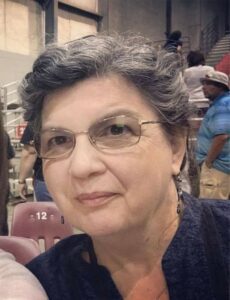Lutherans from across the Commonwealth gathered in the Capital on May 20 to speak up for the hungry, network with statewide advocates, worship, learn about hunger and child nutrition, human trafficking, climate change, prescription drug pricing, the ELCA’s proposed Declaration of Inter-Religious Commitment with keynote Kathryn Lohre, and more. In addition, the day included worship, legislative visits, breakfast, lunch and a celebration of advocates from each synod. The day was designed to equip disciples to live into the beauty of Psalm 133:1: “How very good and pleasant it is when kindred live together in unity!” ELCA Assistant to the Presiding Bishop for Ecumenical and Inter-Religious Relations & Theological Discernment Kathryn Lohre wove this scripture throughout her keynote address on “Setting a Welcome Table with Neighbors of Other Religious and Worldviews”.
When they met with their lawmakers at the Capitol in the afternoon, advocates urged their lawmakers to step up efforts to fight hunger in Pennsylvania by appropriating $21 million for the State Food Purchase Program (SFPP) and $3 million for the PA Agricultural Surplus System (PASS). As a portion of the total state budget, funding for these programs is small. However, the impact on the ability of the state’s charitable food assistance network to provide critical aid and address the issues of Hunger, malnutrition and food insecurity is enormous.
The day began at Trinity Lutheran Church in Camp Hill with the keynote and workshops on Combatting Human Trafficking; Hunger in Pennsylvania; Renewable Energy – Making a Covenant with the Future; Prescription Drug Pricing; and A Declaration of Inter-Religious Commitment: A policy statement of the Evangelical Lutheran Church in America. Afternoon worship celebrated the Spring season Of the Land and Seasons, a quarterly observance of prayer and Holy Communion drawn from life on the farm and Orchard.
Southeastern PA Synod Advocate Mark Staples shared his reflections on Lutheran Day:”Great keynote remarks about the essential significance of Inter-Religious Commitment. I look forward to planning the teaching of a related adult class at our church on the pending ELCA policy statement. We were well-received by the office of Rep. Tim Briggs for a discussion of food sustainability support in the new budget. Great lunch! Thanks Trinity!”
The Rev. Matthew Best, pastor at St. Stephen Lutheran Church, New Kingstown, Lower Susquehanna Synod stated, “The Day of Advocacy is an important day. It’s a day when we acknowledge that faith isn’t just a private matter, but our faith has public implications. We advocate for those who cannot advocate for themselves effectively. We advocate because we are called by Jesus to be public witnesses. We advocate as a way to participate in the unfolding of the reign of God.”
Following lunch, LAMPa celebrated advocates from around the state. The following shared inspiring stories of the Holy Spirit at work in our synods:
Allegheny Synod — Mr. Reeder Swartz and the Congregation of Cassville Lutheran Church
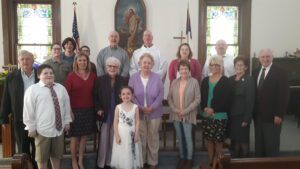 Since there will never cease to be some in need on the earth, I therefore command you, “Open your hand to the poor and needy neighbor in your land.” Deuteronomy 15:11
Since there will never cease to be some in need on the earth, I therefore command you, “Open your hand to the poor and needy neighbor in your land.” Deuteronomy 15:11
Reeder Swartz, a member of Cassville Lutheran Church, partnered with The Central Pennsylvania Food Bank to bring The Military Share Food Program to Huntingdon County. The Military Share Food Program is a food distribution program for military families, active/inactive members, veterans and spouses of deceased military personnel and their family members, at no cost to them, who are living at or below the poverty level.
“In August 2017, the director of Military Share came to the Mapleton VA Clinic and asked the office manager if there was a need for such a program in the area,” said local Military Share administrator Reeder Swartz, who was serving as a volunteer driver for the clinic. “I contacted Greg Stegall Central PA Food Bank Military Share manager. We met, and he explained the program.”
Knowing the program would be of great benefit to many in the area, Swartz visited the seven American Legions and two VFW posts within the county to ask for financial support. Members of the Cassville Lutheran Church, including their Vicar Curt Wingert, also became involved and provide year-round support to the program through phone calls, fund raisers, and assisting with the distribution.
“They all agreed to it and began contributing. The first distribution kicked off in January 2018 with 32 families. I set a goal of 100 families and thought it would take a year, but we hit that goal in April 2018 — in just four months,” said Swartz. The number of families receiving assistance through Military Share Food Program currently is 125 families.
The Military Share Food program in Huntingdon County is a community-wide effort spearheaded by Swartz and supported by the congregation of Cassville Lutheran Church, Vicar Wingert, numerous organizations and community members. Those receiving the food boxes have expressed their deep appreciation for the program and the difference it makes in their lives.
Lower Susquehanna Synod — The Rev. Timothy Seitz-Brown, Bender’s Lutheran Church, Biglerville
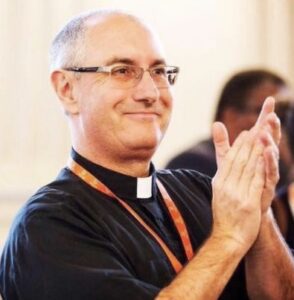 On the 4th of July weekend (2000), I underwent a decisive conversion towards advocacy. It began as a fun, patriotic weekend. Hot dogs, hamburgers, and BBQ chicken were on the grill while we anticipated fireworks in the evening. Unfortunately, we noticed CJ, our eldest, then age 12 over by the swimming pool. He looked like a pale, sickly green ghost who was acting like (pardon the coming image!) “a vomit factory.”
On the 4th of July weekend (2000), I underwent a decisive conversion towards advocacy. It began as a fun, patriotic weekend. Hot dogs, hamburgers, and BBQ chicken were on the grill while we anticipated fireworks in the evening. Unfortunately, we noticed CJ, our eldest, then age 12 over by the swimming pool. He looked like a pale, sickly green ghost who was acting like (pardon the coming image!) “a vomit factory.”
We called the doctor. The doctor instructed us to go to the emergency room. At the Ephrata Community Hospital, they ran a battery of tests which all came back negative. The medical professionals failed to come up with a diagnosis. Then, simultaneously, a light bulb came on for Ann and me, “Could it be malaria?!!” Tests revealed, “Yes!”
Our family had recently returned from a year of teaching at the Manow Lutheran Junior Seminary in Tanzania. Even though we were all taking malaria prevention drugs, CJ, being a normal adolescent, had apparently skipped a few doses. Fortunately, through a college friend, Ann had access to global malaria experts at the National Institute of Health in Bethesda, Maryland. When the experts analyzed CJ’s blood, the results demonstrated he had four different strains of malaria, including plasmodium falciparum, or cerebral malaria, the most deadly form of the disease. So, the NIH experts faxed the name of a new, powerful medication to the hospital to save CJ’s life.
For three straight nights, I slept on a cot next to CJ in the hospital. As his sickness turned into health— I cried each night as I fell asleep with tears of both joy and grief. There was joy because he was alive, and there was deep sorrow because, as I looked at CJ’s IV, I knew that thousands of children would die from this mosquito born disease that year. In my gut, I felt the hole malaria left in the lives of their families.
Therefore, when legislation was introduced in Congress in April 2011, to fund anti-malaria programs in Africa, I became a passionate supporter. The previous Congress had planned cuts to move towards a “balanced budget” and the bill I supported would reverse this decision. Notice: The previous plan started by targeting the first cuts at the ones who were the most vulnerable, beginning with the anti-malaria programs. Sadly, I’ve come to expect this pattern every year at budget time and know that me and my friends are going to have to fight.
That’s why I show up as an advocate in Harrisburg and Washington, D.C.! I both write and visit with elected leaders until they know what I’m going to say—there’s Tim again! —before I even walk in the room, “Yes, let’s be fiscally wise. And, let’s invest in the most vulnerable first and target them for budget cuts last”.
The Masai in Tanzania have a greeting, “Kasserian Ingera?” Not “how do you do” or “how’s it going”, but “how are the children”? This beautiful greeting reveals a primary concern for the next generation, seen in the hoped-for-reply, “all the children are well!”
God the Creator wants health and wholeness for all of the children! Christ, the human embodiment of God, is the Great Physician. And God the Spirit is advocate and defender, showing us Someone who is the side of each of us without desiring the harm of any one of us. So…as long as I have breath, I’m going to tell elected leaders who are to represent me, “The nations are judged by how well we treat God’s most marginalized children. Because God desires all the children to be well!” (Matthew 25:31-46)
Northeastern Pennsylvania Synod — The Rev. Dr. Dennis Ritter, Retired East Berks Mission District
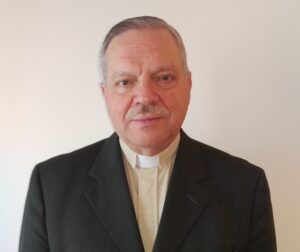 Growing up on my grandfather’s farm, in the quiet country and small-town atmosphere of Nazareth, PA, I was moved and troubled by the protests during the 1960s that I saw on the evening news. I didn’t know what to make of them. While I was a student at Muhlenberg College, majoring in Political Science, I began to more fully understand that for our nation to become the “more perfect union” referenced in the preamble of our nation’s Constitution it is necessary for us to engage in advocacy of various kinds to ensure that all people’s voices are heard in the halls of power at the various levels of government. It was during my time at Muhlenberg that I also began to make connections between advocacy and my faith as a baptized child of God, through studying and reflecting upon the writings of people like the Rev. Dr. Martin Luther King, Jr., Father Daniel Berrigan, Bishop Oscar Romero and others. As I attended seminary to prepare for the ordained ministry, living out my baptismal calling and helping others to do the same became an ever-greater focus of my preparation.
Growing up on my grandfather’s farm, in the quiet country and small-town atmosphere of Nazareth, PA, I was moved and troubled by the protests during the 1960s that I saw on the evening news. I didn’t know what to make of them. While I was a student at Muhlenberg College, majoring in Political Science, I began to more fully understand that for our nation to become the “more perfect union” referenced in the preamble of our nation’s Constitution it is necessary for us to engage in advocacy of various kinds to ensure that all people’s voices are heard in the halls of power at the various levels of government. It was during my time at Muhlenberg that I also began to make connections between advocacy and my faith as a baptized child of God, through studying and reflecting upon the writings of people like the Rev. Dr. Martin Luther King, Jr., Father Daniel Berrigan, Bishop Oscar Romero and others. As I attended seminary to prepare for the ordained ministry, living out my baptismal calling and helping others to do the same became an ever-greater focus of my preparation.
In my first call it meant helping a small, rural-suburban congregation to see as part of its mission the appropriateness of resettling an amerasian family and later to become the only non-city church to provide space for a men’s roving homeless shelter in its building. In addition, this call provided me with the opportunity to join my voice with other clergy in the community to get our local hospital to provide more full and appropriate spiritual care for its patients and staff than the volunteer services provided by our local ministerium. These successes gave me courage to continue to lift up advocacy along with service and proclamation as an important part of the Christian life for those I was called to pastor and for me.
So, it has been in all of my calls that I have sought to help my sisters and brothers in Christ engage, not only the biblical texts, but also what those texts are saying to us here and now as we seek to be the hands, feet and heart of a gracious and loving God.
Having entered into retirement recently, I continue to seek out ways, not only to serve those in need, but to be an advocate with and for those whose voices are often neglected in the halls of power. I have frequently said that we Lutherans are great at doing acts of service but not so great at raising our voices on behalf of those who are the least among us. So, I am grateful for organizations like LAMPa that help me and others to connect with our baptismal call “to care for others and the world God made, and work for justice and peace (from the baptismal liturgy, ELW, p. 228)” through advocacy. My current energy and efforts are focused on public education as I have been given the opportunity to serve on our local school board where I hope to be a voice for ensuring that a quality education is available to all children, no matter their circumstance or lot in life.
I thank God and my many mentors who have helped me grow through the years in the use of my voice for the well-being of others.
Northwestern Pennsylvania — The Rev. Deborah Kreger Jacobson, Pastor St. Peter, St. Petersburg; St. John, Emlenton and Grace, Clarion
“…the leaders scoffed at him [Jesus], saying “He saved others; let him save himself if he is the Messiah of God, his chosen one!” The soldiers also mocked him, coming up and offering him sour wine, and saying, “If you are the King of the Jews, save yourself!” …One of the criminals who were hanged there kept deriding him and saying, “Are you not the Messiah? Save yourself and us!” Luke 23:35-37
Throughout the Passion people are trying to get Jesus to save himself. They seem to think that if you have power you are going to use it to save yourself. But from the beginning of his ministry Jesus uses his power to save others, to give others more abundant lives.
Advocacy is an opportunity for us to use our power (our voice, our vote) to let our government know which decisions they are making affect the quality of our lives. And not just our lives but, also, the lives of our neighbors. Women of the ELCA has been instrumental in teaching me to claim my power, confidently use my voice, encourage and empower others to find their voices. ELCA advocacy and in particular LAMPA provide support, training, and information that assures that advocacy is based in biblical values and Lutheran confessions. In community we use our power to speak for a safe abundant life for all.
Southeastern Pennsylvania Synod — Julia Menzo, Director of Community for Lutheran Congregational Services, a ministry of Liberty Lutheran Services
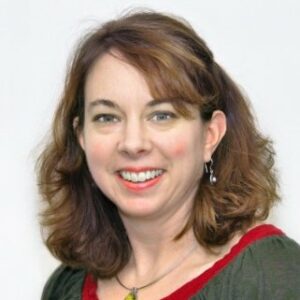 My experiences and my Creator make me who I am, and I am grateful to be able to have a work life that is so encompassing of how I am made. My father is an environmental engineer who traveled the world bringing water systems to places in conflict. My mother was a teacher who taught me her mother’s recipes. Those influences along with an innate interest in the outdoors led me to a degree in natural resource economics and an interest in the root causes of injustice. These gifts are useful in my service as Lutheran Disaster Response Coordinator for eastern PA, and especially as the impact of climate change on the frequency of disasters is becoming more and more a part of our daily lives. I am currently leading LDR’s efforts in response to fall 2018 flooding across eastern Pennsylvania and also continuing to lead efforts to assist families who evacuated to Philadelphia, Reading, and Allentown, PA, following Hurricane Maria in 2017.
My experiences and my Creator make me who I am, and I am grateful to be able to have a work life that is so encompassing of how I am made. My father is an environmental engineer who traveled the world bringing water systems to places in conflict. My mother was a teacher who taught me her mother’s recipes. Those influences along with an innate interest in the outdoors led me to a degree in natural resource economics and an interest in the root causes of injustice. These gifts are useful in my service as Lutheran Disaster Response Coordinator for eastern PA, and especially as the impact of climate change on the frequency of disasters is becoming more and more a part of our daily lives. I am currently leading LDR’s efforts in response to fall 2018 flooding across eastern Pennsylvania and also continuing to lead efforts to assist families who evacuated to Philadelphia, Reading, and Allentown, PA, following Hurricane Maria in 2017.
Southwestern Pennsylvania Synod — Southwestern PA Synod Church in Society Committee
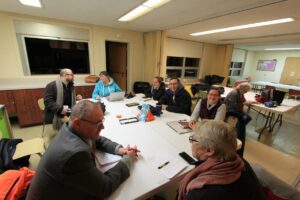 The ELCA social statement called, “Church in Society: A Lutheran Perspective,” was the very first social statement adopted by our denomination in 1991, just a few years after its formation. In the introduction of this, our first social statement, it states that “the Evangelical Lutheran Church in America is called to be part of the ecumenical Church of Jesus Christ in the context in which God has placed it – a diverse, divided, and threatened global society on a beautiful, fragile planet. In faithfulness to its calling, this church is committed to defend human dignity, to stand with the poor and powerless people, to advocate justice, to work for peace, and to care for the earth in the processes and structures of contemporary society.”
The ELCA social statement called, “Church in Society: A Lutheran Perspective,” was the very first social statement adopted by our denomination in 1991, just a few years after its formation. In the introduction of this, our first social statement, it states that “the Evangelical Lutheran Church in America is called to be part of the ecumenical Church of Jesus Christ in the context in which God has placed it – a diverse, divided, and threatened global society on a beautiful, fragile planet. In faithfulness to its calling, this church is committed to defend human dignity, to stand with the poor and powerless people, to advocate justice, to work for peace, and to care for the earth in the processes and structures of contemporary society.”
We as members of the body of Christ in the world are all called to be participants in society, witnessing to the love and justice of God through word and deed. And as is the case with many things, it is easier to love the world through word and deed with the help and encouragement of our siblings in Christ.
The Church in Society Committee of the Southwestern Pennsylvania synod is charged with the responsibility of listening and speaking to society on behalf of the synod, as well as educating and empowering members of our synod in regard to the following issues: peace and justice advocacy; hunger concerns, global and domestic; environmental stewardship; poverty and unemployment, social ministry advocacy; and inclusiveness within our synod. Special task forces within our synod relating to these responsibilities include Hunger, Immigration, Inclusiveness and Diversity, and an Environmental Stewardship task force that is still in formation.
As a committee, we are made up of a diverse group of lay and ordained leaders from across our synod, each bringing different passions and gifts to the table. The mission and ministry of education and invitation to loving service are shared across all interests and task forces. Part of our work includes recognizing the interconnectedness of all creation, reflected in our most recent Lenten Challenge – to raise awareness and reduce the prevalence of single-use-plastics by our churches and their members. What seeds of change have been planted by this work, only time will tell.
Advocacy is naturally part of the work that our committee does together, not only in partnership with LAMPa, but also with other organizations who share our work. Advocating for just and loving budgets and policies is part of our calling to witness through word and deed to what God has done, and will continue to do in our world. There’s an African proverb that says, we can go faster alone, but further together. We have found this to be true and will continue to invite others to join us in this calling we all share.



